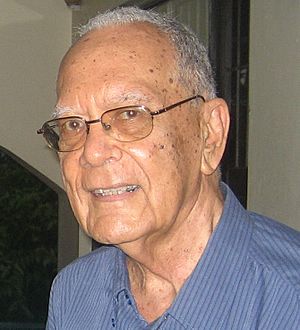Charles Walker (Fijian politician) facts for kids
Quick facts for kids
Charles Walker
|
|
|---|---|
 |
|
| Ambassador to the Empire of Japan, Republic of South Korea & The People's Republic of China | |
| In office 16 January 1988 – 29 May 1993 |
|
| Preceded by | Tui Cavuilati |
| Succeeded by | Robin Yarrow |
| Minister of Information | |
| In office 1987–1988 |
|
| Minister of Finance | |
| In office 1979–1983 |
|
| Preceded by | Charles Alexander Stinson |
| Succeeded by | Mosese Qionibaravi |
| Minister of Agriculture and Fisheries | |
| In office 1977–1979 |
|
| Preceded by | Douglas Walkden-Brown |
| Succeeded by | Jonati Mavoa |
| Member of the House of Representatives | |
| In office 1987 |
|
| Preceded by | Ted Beddoes |
| Constituency | Vanua Levu–Lau–Rotuma General National |
| In office 1977–1987 |
|
| Preceded by | Douglas Walkden-Brown |
| Succeeded by | James Ah Koy |
| Constituency | Eastern General National |
| Personal details | |
| Born | 12 June 1928 Sawana Village, Lomaloma District, Vanua Balavu Island, Lau Province, Fiji |
| Died | 11 March 2021 (aged 92) Suva, Fiji |
| Political party | Alliance Party (Fiji) |
Charles Walker (12 June 1928 – 11 March 2021) was an important person in Fiji's government and a diplomat. He worked as a civil servant and was a politician for the Alliance Party. He was also awarded the CMG for his service.
Contents
Early Life and Education
Charles Walker was born in 1928 in the village of Sawana. This village is located in the Lomaloma district on Vanua Balavu island. This island is part of the Lau group in Fiji.
He was registered in the Vola ni Kawa Bula. This is a special Fijian register of births. It allowed him to claim rights to native land and fishing areas. His father, Ernest Fearon Walker, was a Scottish settler. His mother, Vilimaina Saulo Fotofili, was from the local Yavusa Tonga group. Charles grew up experiencing both traditional Fijian life and the modern Western world.
Charles went to Levuka Public School. He then finished high school at Marist Brothers High School in Suva. After that, he studied at the University of Otago in New Zealand. He earned a degree in Agricultural Science in 1948. Later, he also got a master's degree in agriculture from the University of Trinidad & Tobago.
A Career in Public Service
Charles Walker started his career in the late 1940s. He worked for the Colonial Department of Agriculture as a Senior Agricultural Officer. By 1958, he became the Director of Agriculture. When Fiji gained more self-government in 1966, he became Deputy Secretary of the new Ministry of Agriculture. In 1969, he became the Permanent Secretary for Agriculture.
After Fiji became independent in 1970, he worked in different government departments. These included Finance and Foreign Affairs. He then became the Permanent Secretary to the Public Service Commission. This made him the first local person to lead Fiji's civil service.
Becoming a Politician
In 1977, Charles Walker was asked to join politics. The leader of the Alliance Party, Ratu Sir Kamisese Mara, invited him. Charles resigned from the Civil Service to run for a seat in Parliament. He won the Eastern General National seat. He held this position until 1987.
During his time in Parliament, he served as a Minister. He was the Minister of Agriculture and later the Minister of Finance. He even served as Acting Prime Minister a few times. He resigned as Minister of Finance because he had different ideas from the Prime Minister. This was about how to handle a worker dispute. He then continued to serve as a regular Member of Parliament.
After the 1987 Coup
After a military takeover in 1987, Charles Walker briefly served as an Interim Minister for Information. In late 1988, he was appointed as Fiji's Ambassador to Japan. This meant he represented Fiji in Japan.
When he returned to Fiji in 1993, he took on several important roles. He became the Chairman of the Public Service Commission. He also chaired the Police Services Commission. He was a member of the Higher Salaries Commission and Chairman of the Civil Aviation Authority of Fiji.
He later resigned from these roles due to disagreements with the government at the time. He then became Chairman of Fiji Pine Limited. He also joined the boards of other private companies.
After some changes in government in 2000, he resigned from Fiji Pine. He felt there were conflicts with the new temporary government.
When democracy returned in 2001, he was asked to help with the sugar industry. He became the Chair of the Sugar Industry Restructuring Committee. After this work was done, he became an advisor to the government on the sugar industry. He continued in this role until 2006. At that time, a new military government took control, and he was removed from his position.
Charles Walker then retired to his family home in Suva.
Family Life
Charles Walker was the youngest of three children. His parents were Ernest Fearon Walker and Vilimaina Saulo Fotofili.
He married Adi Alisi Davila Walker née Uluiviti. She was born in 1937 and came from the village of Natauloa on Nairai island. She is an active member of the Methodist Church of Fiji and Rotuma. Her elder sister, Adi Losalini Raravuya Dovi, was one of the first women to be a Member of the Legislative Council. Charles and Alisi had three children: Martha Jean, Lilian Davila, and Ernest Fearon.
Charles Walker passed away in Suva on 11 March 2021, at the age of 92.
Images for kids


